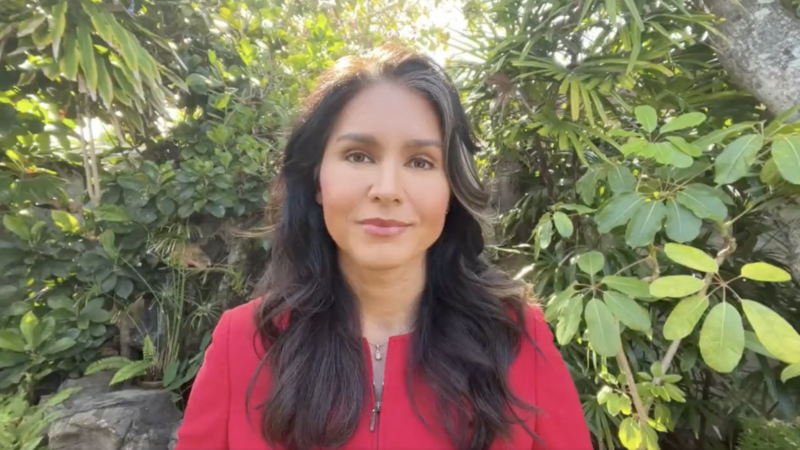No, DOJ Shouldn't Investigate Tulsi Gabbard for 'False Russian Propaganda'
"Ukraine biolabs" is a textbook example of why the mainstream media's push to outlaw so-called disinformation is irresponsible.

The hosts of The View opened their show today with extended criticism of former congresswoman Tulsi Gabbard and Fox News host Tucker Carlson for allegedly spreading "false Russian propaganda" relating to Vladimir Putin's invasion of Ukraine. They also called on the U.S. Department of Justice to investigate the pair.
"They used to arrest people for doing stuff like this," lamented Whoopi Goldberg.
Perhaps Goldberg was referring to U.S. government efforts to root out Russian spies who fed information to the Soviet Union during the Cold War. It is a crime to share state secrets with hostile foreign governments. But that's not what Gabbard and Carlson are doing; it's not even close.
Gabbard, Carlson, and others who take a contrarian position on the Russia-Ukraine conflict are engaged in speech protected by the First Amendment. Their views might be wrong, but they are free to share them. Americans do not suddenly lose their right to express political opinions that are disfavored by the mainstream media and the U.S. government in the event of a war between two other nations. Indeed, we should not lose our right to free speech even if the U.S. itself goes to war.
A century ago, during World War I, the U.S. Supreme Court placed unfortunate restrictions on the rights of Americans to organize against war. While the decisions in Schenck vs. Ohio and Debs v. U.S. were never explicitly overturned, subsequent Court decisions gradually invalidated the logic behind them; the modern Supreme Court takes a fairly maximal position on the First Amendment, and the right to express anti-war views—even if some people view them as offensive, insensitive, or inaccurate—is now well established. The DOJ can't investigate Carlson for sounding insufficiently hostile to Putin.
RUSSIA USING TUCKER CARLSON IN PROPAGANDA? After a leaked Kremlin war memo reportedly instructed Russian state media to play Tucker Carlson clips and Tulsi Gabbard is being accused of spreading Russian false flag propaganda, #TheView panel reacts. https://t.co/cVclFZQmjA pic.twitter.com/yzbQBrpmbT
— The View (@TheView) March 14, 2022
Gabbard's statements are also protected by the First Amendment, even if they constitute "false Russian propaganda." But it's worth looking more closely at her most recent claim, because I'm not at all convinced that it was characterized fairly. Gabbard is currently catching flak for voicing concerns about "U.S. funded biolabs in Ukraine," a line that The Washington Post has branded "Russian disinformation" and Sen. Mitt Romney (R–Utah) considers to be "treasonous lies."
Again, there's nothing treasonous about what she said, even if it was wrong; treason is a crime, theoretically repeating Putin's justifications for war is not. It's clearly not entirely wrong, though. Under Secretary of State Victoria Nuland recently confirmed to Sen. Marco Rubio (R–Fla.) of the Senate Foreign Relations committee that Ukraine does indeed possess biological research facilities and that she is worried about Russia taking them. Quoting the State Department, The New York Times described them "as diagnostic and biodefense laboratories" rather than "biological weapons facilities." The Times goes on to quote Robert Pope, director of the Pentagon's Cooperative Threat Reduction Program:
Mr. Pope had warned that Russia's invasion of Ukraine may damage laboratories in the country that conduct research and disease surveillance and are supported by the United States. He noted that some of the facilities may contain pathogens once used for Soviet-era bioweapons programs, but he emphasized that the Ukrainian labs currently did not have the ability to manufacture bioweapons.
"There is no place that still has any of the sort of infrastructure for researching or producing biological weapons," Mr. Pope said. "Scientists being scientists, it wouldn't surprise me if some of these strain collections in some of these laboratories still have pathogen strains that go all the way back to the origins of that program."
Scientists being scientists? Forgive me for not being entirely set at ease by this, especially given what the public has learned about lax oversight in U.S.-funded foreign laboratories that conduct research on pathogens. A laboratory's research on pathogens can be of great concern, whether or not the research is being used to create a weapon on purpose; similarly, most people who suspect that COVID-19 emerged from the Wuhan laboratory think it was an accident, not a deliberate biological weapon.
Again, it's perfectly possible that there's no real danger here, and both the Russians and Gabbard have raised erroneous concerns about the laboratories. I'm not sure how anyone could be entirely certain that this is the case, though. Indeed, while The Washington Post's fact-check laments that the American right has "embraced Russian disinformation about 'U.S. bioweapons labs' in Ukraine," the actual article claims that loss of power to the lab in Kharkiv could inadvertently result in the release of several pathogens.
"Andrzej Jarynowski, a Polish infectious-disease epidemiologist, said Kharkiv's Institute of Experimental and Clinical Veterinary Medicine is one of the best labs between Greifswald, Germany and Pokrov, Russia—a distance of about 1,300 miles," wrote The Post's Glenn Kessler. "He said ASF, Bacillus anthracis, avian Influenza viruses, Francisella tularensis, brucella, salmonella, E. coli (toxin producing), Borrelia sensu lato and the coronavirus were studied at Kharkiv, a city now under siege, with active agents stored until the invasion."
And the hosts of The View want the DOJ to investigate—or even imprison—political commentators who are vexed by all this? Really, it's a textbook example of why the mainstream media's push to outlaw so-called disinformation is deeply irresponsible.


Show Comments (221)